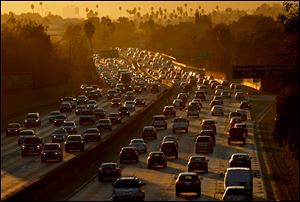
Which way on CAFE?
8/6/2018
President Trump’s EPA is rolling back Obama-era rules for U.S. automakers on fuel economy and greenhouse gas emissions.
The Trump administration has made its case for freezing the so-called CAFE requirement for increased fuel economy in American automobiles. But the argument is less than fully persuasive.
The proposal, rolled out last week by the Department of Transportation, would halt the mandated increases in fuel economy that are ordered to take place in model years 2021 through 2026. Instead of continuing to rise, the standards would stay the same as model year 2020, when the new fleet will have to average 30 miles per gallon in real-world driving.
Click here to view more Blade editorials
The administration is following the accepted protocol for proposing a change in the Corporate Average Fuel Economy (CAFE) standard and it deserves a hearing. Interest groups and the industry have 60 days to comment before any changes can be adopted.
The auto industry, in agreeing to these standards in 2012, insisted on a mid-term review in 2017, and were assured of it. Instead, according to the auto industry, the Environmental Protection Agency, seven days before Donald Trump’s inauguration, rushed the mid-year review and unilaterally imposed the final five years of CAFE increases.
The two relevant agencies — the National Highway Traffic Safety Administration and the EPA — under new leadership, now contend that postponing the costly next level of the CAFE mandate — to 54.5 mpg by 2026 — will actually encourage consumers to go out and buy newer, safer cars and will have minimal impact on the environment. They say that imposing the higher standards, on the other hand, would freeze demand.
They argue that the 2021-2026 standards will be significantly costlier and more difficult for car makers to achieve, leading to increasing the price of cars by $2,340. And consumers would balk.
The Trump administration contends that lower car prices will spur consumers to junk their old cars, now averaging 12 years, and replace them with newer cars with better airbags, rear view cameras, and other safety improvements, not to mention the improved engine efficiency already mandated.
There is a case for a CAFE freeze, but there should be congressional hearings and thoughtful national debate on this matter.
No one wants to cripple the American car industry. And if delaying the more demanding CAFE standards gets more people into safer, fuel efficient cars than immediate application of the more stringent standards, that is a no-brainer. Let’s just be sure that this is a solid prediction, based on data, and not a rationalization. There will always be reason to delay strict conservation standards.
The car companies are not all to blame on CAFE standards. Americans consumers are driving the market. They roundly prefer bigger cars with more powerful engines to highly fuel efficient, hybrid, or electric cars. With cheap fuel, they have little reason to change. There is no real incentive for Americans to move to smaller, greener cars.
To achieve conservation, the incentives for auto buyers, not just auto makers, will have to change. But no one is saying there is a gas tax in our future, which is something we ought to at least talk about.